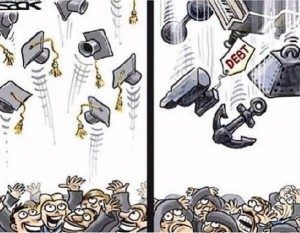Deonarine Karan
English 1101
Revision One
Can Education be bought?
We are trapped in a society that if we have no education people look down upon us and treat us unfairly. Many people think they could buy their way through education. We should bring real reforms that make sure we have a good teacher in every classroom and gives parents the option of where they send their kids to take the steps they need in order to be successful. A good teacher has a strong relationship with their students and show they care and they make time for students when they’re in need of help. “The federal government throws dollars at the state, the state throws dollars at local school boards and the local boards throw dollars at schools”, which shows money affects the way schools operate because if they don’t do what they are told the money schools get could be affected. So, schools have no say in education because their primarily focus is the “money”, the positive is making the school better but on the other hand the government controls every aspect of education. “Buying education” by Robert Ware is connected to people cheating their way through education because they are afraid of failing.
According to Robert Ware, the school board should develop a SWOT analysis Strengths, Weaknesses, Opportunities and Threats) which shares reports with other schools to help each other. A SWOT analysis for schools is a tool that can provide prompts to the governors, management teachers and staff involved in the analysis of what is effective in the schools systems and procedures. A SWOT analysis could be used for planning activities which could impact future finances. The best way for SWOT analysis to work is teamwork.
Many teachers don’t enjoy their jobs because students are focused on passing the class and not really caring about learning but you can’t blame us we are afraid to fail in this society so we have to turn to cheating to succeed. But if we get a education and not a schooling like John Taylor Gatto states students would try their best to succeed in school rather than cheating or buying their way through school. The difference is that “schooling”is something that kids have to do for twelve years, and five days a week for nine months and “education” is only if a kid really wants to. Is it possible that George W. Bush accidentally spoke the truth when he said we would “leave no child behind” (Gatto 2), students want to be motivated to be encouraged to have the qualities to succeed in life they don’t want to feel like they were forced to learn material that society thinks they have to. We suppress our genius only because we haven’t yet figured out how to manage a population of educated men and women (Gatto 5), which shows the solution that we should be able to manage our life ourselves rather than depending on anyone. We could encourage the best qualities of the youthfulness- curiosity, adventure, resilience, the capacity for surprising insight by being more flexible about time, texts, and testing (Gatto 1), these methods would be more meaningful for a students learning life span that would help them grow, develop, and succeed. Education should be something you are really passionate about. Stick yourself onto a subject that you really like, when I was in high school I enjoyed history and English class because I did my best work on short responses.
For example, when I say do something you’re passionate about don’t go out your way and do something that’s not you. Many people experience cheating or someone they know cheating because they are afraid of failure. Recently, on my essay I used another author’s writing piece and put it onto my essay to seem as I wrote it but it wasn’t in my words or my ideas. I learned from that experience that cheating is not worth it because you don’t only fail the assignment you fail yourself because you could of done a better job doing the assignment yourself. In my opinion, people cheat to get out of something they’re not good at. But sometimes they are so afraid of failure they don’t even try at all.
In Robert Leamnson article “Your First Job”, he shows the difference between the two components of learning and understanding. “So it is that we can understand something quite clearly, and some time later not be able to remember what it was we understood” (Leamnson 3) which shows we didn’t keep the information we learned because we feel like we don’t need it in everyday life. “The reason something must be said about so commonplace a thing as the classroom is that too many students see it incorrectly and so they waste a highly valuable occasion for learning” (Leamnson 3), many students see the classroom like a jail cell that has you locked away from society with no place to move or be free. In other words there’s no space for a student to spread his wings and fly independently and show their true worth. They need experiences to keep succeeding in life, and the only way to gain this knowledge is to learn about life, to see and experience how to manage them in life. Education is best described as a privilege that not many have but we should use it as our advantage to succeed and learn from personal experiences.
Citation:
Ware, Robert. “Reader: You can’t buy an education.” Reader: You can’t buy an education | News, Sports, Jobs – The Intermountain. 2019. 04 Apr. 2019 <http://www.theintermountain.com/opinion/letters-to-the-editor/2019/03/reader-you-cant-buy-an-education/>.





